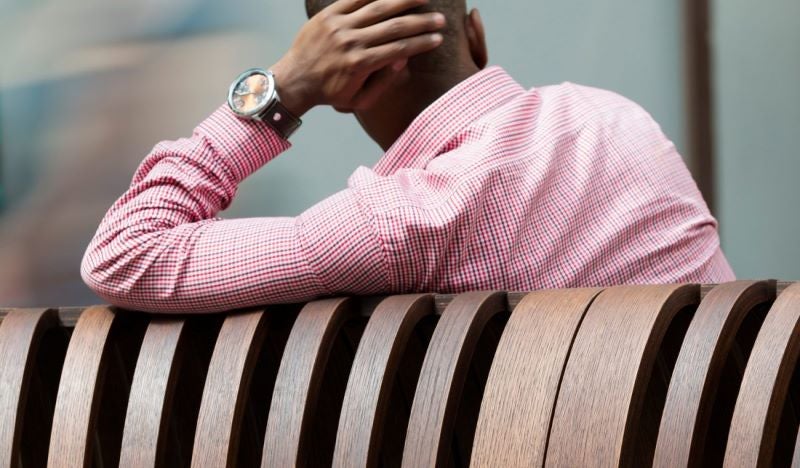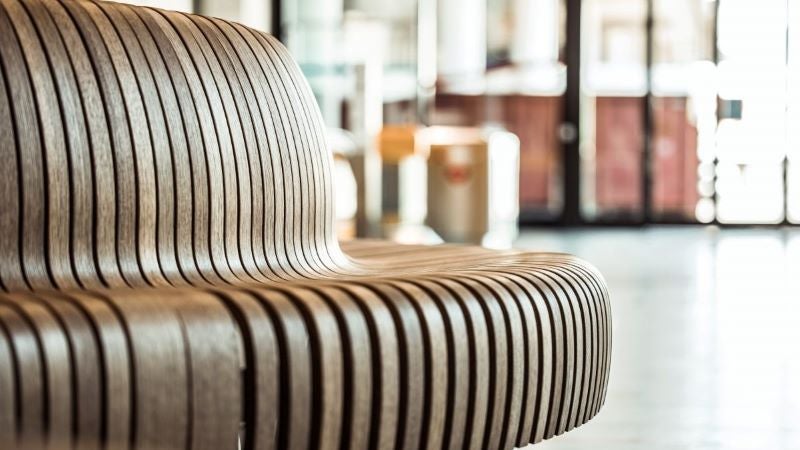

Designing a public space requires a lot more than what meets the eye. Layout, flow, seating capacity, acoustics, and lighting all come into play. One of the most important pieces of this puzzle is to carefully plan the choice of materials used in space. Designers can choose from plastic, glass, metal, or wood, not to mention a variety of fabrics and foams. The options can be overwhelming, especially when balancing the aesthetics of the materials with their comfort, sustainability, durability, and safety. As we are moving towards making greener choices in our lifestyles and reducing our carbon footprint, thinking in an environmentally friendly way when designing a public place has become a top priority. With wood being one of the highest trending materials, Green Furniture Concept sees it as an easy and natural choice when designing for the future.
Wood feels good
Can wood seating be more comfortable than cushioned seating? Many wouldn’t think so, but the Green Team beg to differ! Basic logic might lead many to conclude that cushioned seats are soft, therefore comfortable, and wooden seats are hard, therefore uncomfortable. While this may seem like a fair deduction, it shouldn’t have to be true. A well-designed wood seat could be just as comfortable, if not even more comfortable than upholstered seating; it all depends on the ergonomic curvature of the wood. If a wooden seat has been designed to properly contour the shape of your body, it offers an exceptionally comfortable and supportive seating experience, despite its hard appearance. Conversely, if a cushioned seat is constructed with minimal curvature and weak padding, it will feel very uncomfortable, despite its soft appearance.
When a wood seat is designed properly, it should offer anywhere between 45 to 120 minutes of comfortable continuous usage, leaving the user with a refreshed lumbar region when it’s time to get up. This is the standard to which we uphold our wooden seating lines.
Wood is antiseptic
Let’s consider that trees have survived and thrived in nature since the beginning of time despite the threat of several dangerous microorganisms, bacteria, and viruses. Let’s also consider that for centuries, chefs all over the world have used wooden chopping blocks to cut and prepare raw fish, poultry, and meat. These two facts may seem unrelated, but they have one common link- both are made possible because wood is naturally antiseptic and antiviral. In other words, wood has the ability to naturally prevent the growth of disease-causing microorganisms.
Green Furniture takes comfort in knowing that wood is one of the safest materials for public places. Studies that tested the survival of bacteria on wood versus plastic have shown that pine and oak outperform plastic when it comes to their antibacterial abilities.
In addition, wood’s natural abilities against bacteria and viruses can be enhanced with the use of a natural wax finish such as beeswax, which is a natural antiseptic. Similar to the effects of beeswax, Green furniture finishes all its furniture using a natural hard wax oil sourced from Carnauba Palms and bees.
Wood ages with dignity
We have all seen an old leather handbag or briefcase with scratches, pleats, and marks all over the surface. We tend to assign tremendous value to these kinds of vintage pieces because they have more character than when they were brand-new. Similarly, we assign great value to a used wood surface because unlike most other materials used in furniture design, wood ages with dignity. In fact, the older wood gets, the more interesting and complex it looks.
Wood is an exceptionally durable material that has proven the test of time over centuries. The key to preserving the appearance of a wood surface for several years is to apply the right finish. Lacquered and stained woods tend to dry and crack over time. The ideal way to finish wood is with a hard wax oil, which forms a long-term molecular bond with the wood instead of simply soaking it into the surface and drying up over time
Wood has a classic beauty
There is an intrinsic warmth that can be felt in an interior space when designers incorporate wood materials and wood furniture into their projects. Unlike any other man-made materials, the use of wood indoors mimics the effects of spending time outside in nature. In fact, studies have identified that the presence of wood indoors is associated with an enhanced feeling of physiological and psychological well-being. It can lower blood pressure and heart rates, reduce stress and anxiety, and increase positive social interactions.
Best of all, wood has withstood the test of time. From historic castles to modern Scandinavian furniture, wood designs have adapted over time, but what has remained a constant is the timeless and classic beauty of this material.
Wood is a circular material
Wood is a renewable material that has been used freely for centuries, however, today more than ever, it is of utmost importance to use responsibly sourced and certified wood to ensure environmental sustainability.
Since this material can be regrown naturally, Green invests annually in a robust replanting program. We plant a tree for every product sold to close the biological cycle we start when the trees we use are cut down. We focus our replanting efforts where it matters. The most biodiverse and complex forests around the world are the tropical rainforests, which is why we choose to replant the majority of our trees in Colombia. Green recently reached the goal of becoming climate positive.
In addition to the cyclical nature of this material, the processing of wood has far fewer environmental implications than that of man-made materials, which in turn is better for the environment.

